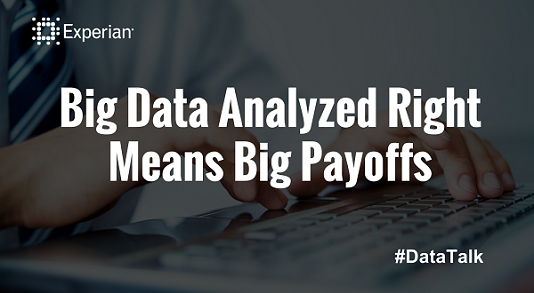All posts by Editor

 The term big data tends to be overused in business today. While some refer to it as a technology and others a level of insight, it has come to embody many different data actions, from business intelligence, to analytics and data modelling.
We have become so obsessed with big data that we think we have to have this level of insight as a requirement to running a successful business.
The term big data tends to be overused in business today. While some refer to it as a technology and others a level of insight, it has come to embody many different data actions, from business intelligence, to analytics and data modelling.
We have become so obsessed with big data that we think we have to have this level of insight as a requirement to running a successful business.

Confronted with a vast amount of incoming data, today’s digital marketers are facing an on-going battle to keep up. According to Experian Marketing Services’ 2015 Digital Marketer Report, the biggest hurdles and key priorities for marketers this year are dependent on having accurate, enriched data that can be linked together in a central location for a complete customer view.

 The last decade was a tumultuous financial period for Americans.
In the mid-to-late 2000s, economic activity declined rapidly and marked the largest downturn since the Great Depression. It is estimated that Americans lost nearly $16 trillion of net worth during this time. To make matters worse, unemployment rates doubled. The booming U.S. housing market plummeted along with the stock market which caused a chain reaction in exposing significant flaws within the financial ecosystem.
The last decade was a tumultuous financial period for Americans.
In the mid-to-late 2000s, economic activity declined rapidly and marked the largest downturn since the Great Depression. It is estimated that Americans lost nearly $16 trillion of net worth during this time. To make matters worse, unemployment rates doubled. The booming U.S. housing market plummeted along with the stock market which caused a chain reaction in exposing significant flaws within the financial ecosystem.

Buying a home is one of the best times to know about your credit. According to a recent survey by Experian, many of those in the market for a home already know the wisdom of credit score insight. However, only half of recent buyers said they checked their credit when they first considered purchasing a home.

Today, Experian and the nationwide credit reporting agencies announced another important step in our work to improve the credit lives of consumers and create a healthier financial ecosystem. The settlement between 31 state attorneys general and Experian, Equifax and TransUnion concludes months of productive discussions and our industry is proud of the results.

 The following article is a guest post from, John C. Linfield, Executive Director at the Institute for Financial Literacy
At the end of “Financial Literacy Month” here in the United States, it seems appropriate to take a moment and think about why we should become financially literate, and how we can use that to stay on track for the long term.
The following article is a guest post from, John C. Linfield, Executive Director at the Institute for Financial Literacy
At the end of “Financial Literacy Month” here in the United States, it seems appropriate to take a moment and think about why we should become financially literate, and how we can use that to stay on track for the long term.

 People are making a big deal about big data—and it is a big deal.
It has the power to guide us in addressing some of our nation’s most pressing needs, from protecting against fraud at the checkout counter to helping families secure affordable loans that help them accomplish their dreams. And like any powerful tool, it must be deployed wisely; in the wrong hands, as Hollywood saw recently, data can be hacked.
People are making a big deal about big data—and it is a big deal.
It has the power to guide us in addressing some of our nation’s most pressing needs, from protecting against fraud at the checkout counter to helping families secure affordable loans that help them accomplish their dreams. And like any powerful tool, it must be deployed wisely; in the wrong hands, as Hollywood saw recently, data can be hacked.

At Experian we believe that data is good. Good for our economy, good for consumers and good for society. Analytics and technology designed to help marketers put their data to use and become truly customer-centric is just one example of using data as a force for good. The following column was written by Emad Georgy, senior vice president of development and global head of development at Experian Marketing Services, as part of a “Data-Driven Thinking” series for AdExchanger.

At the start of the Vision 2015 Conference, Experian® announced a new dedicated enterprise Fraud and ID business in North America. This newly established business unit allows Experian, the leading global information services company, to more aggressively address the growing variety of fraud risk and identity management challenges businesses, financial institutions and government agencies face.